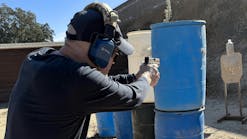New Medical Emergency Training for New Orleans Police Helping to Save Lives
By Gabriella Killett
Source The Times-Picayune | The New Orleans Advocate
New Orleans police detective John Huntington was among the first to graduate from a new emergency medical responder program that aims to help officers like him save lives, when three days later he put his training to the test.
On Sept. 8, Huntington found himself at a home in Mid-City with a man who had just been shot by a different officer during a domestic call. Justin Martin was lying on the ground bleeding from a gunshot wound. Police say Martin had shot at an officer who returned fire, hitting him in the chest.
"He was having a hard time breathing," Huntington said. "He wasn't getting much air."
Huntington is one of eight NOPD officers in the first graduating class of the Emergency Medical Responder program, and his new training likely saved a life that day, officials have said.
He knew to take out a chest seal from the medical kit he was given at graduation and to cover Martin's wound to prevent him from suffocating. New Orleans paramedics soon arrived and took over.
"He had the equipment and the training to be able to immediately deploy it," said NOPD Sgt. Andrew Packer.
More 'trained hands'
The medical responder training program was Packer's brainchild. A paramedic working as a commissioned officer in NOPD's 2nd District, Packer saw the drawbacks to a policy that keeps paramedics from entering a police scene that isn't yet cleared. By that point, it can be too late for the critically wounded.
Packer said he brought up the idea for an emergency responder training curriculum with NOPD Superintendent Anne Kirkpatrick the first time he met her.
"Immediately, she was very receptive," Packer said. "After a few meetings and several hours of sitting down with New Orleans EMS command staff, we basically devised a way that that could be done, and that was through the training."
New Orleans EMS hosted the eight officers for a nine-week training course at its Earhart Boulevard facility. EMS Capt. Matteo Avocato was their instructor.
Huntington said the class went far beyond the baseline medical training he received in the police academy. Officers addressed medical dilemmas they faced in their day-to-day jobs, while training on dummies.
The process was about prepping officers for emergency medical situations, he said, and having paramedics and police officers work in tandem. Officers learned how paramedics operate at crime scenes, helping to allay suspicions that police often have about medical personnel trampling on crime-scene evidence.
"Nobody is trying to do their job at the expense of anyone else," Packer said.
The department hopes to pass three eight-person classes annually. With fewer paramedics than police officers in the city, the program ultimately is aimed at ensuring quick emergency responses for the injured.
"If any number of those police officers are trained, they're probably going to be closer to a medical call than we are, and that gets another set of trained hands to a patient faster," Avocato said.
____
(c)2024 The Times-Picayune | The New Orleans Advocate
Visit The Times-Picayune | The New Orleans Advocate at www.nola.com
Distributed by Tribune Content Agency, LLC.



